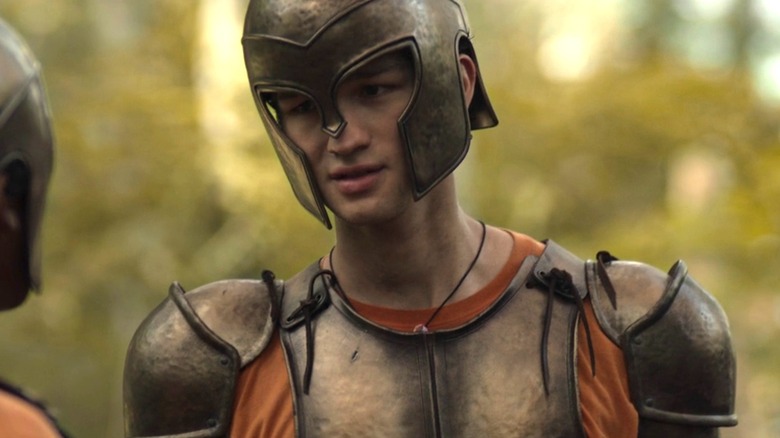Why Did Luke Steal The Lightning Bolt In Percy Jackson?
As fans of both Disney+'s "Percy Jackson and the Olympians" and the Rick Riordan-penned books that inspired it will know, the series' titular hero is thrown headfirst into its world of half-blood demigods, monsters, and Greek deities when he is wrongfully suspected of stealing Zeus' Master Bolt. Riordan's first "Percy Jackson" novel, aptly titled "The Lightning Thief," follows Percy (Walker Scobell) and two of his friends, Annabeth (Leah Sava Jeffries) and Grover (Aryan Simhadri), as they set out on a quest to retrieve Zeus' bolt and clear his name. At the end of "The Lightning Thief," it's ultimately revealed that Zeus' weapon was stolen by none other than one of his closest friends, Luke Castellan (Charlie Bushnell).
Percy learns that Luke stole both Zeus' bolt and Hades' Helm of Darkness because he was ordered to do so by Kronos, the banished King of the Titans. Luke pledged his fealty to Kronos after being persuaded by the Titan's promises of vengeance against the Greek gods of Olympus. Kronos believed the theft of Hades' and Zeus' most prized weapons would spark a civil war among the gods that would result in their downfall and pave the way for him and his fellow Titans to return to power.
His and Luke's plan nearly works, too. However, Percy, Annabeth, and Grover manage to successfully return Zeus' and Hades' weapons to them. Luke's failure to prevent Percy from doing so doesn't immediately result in his imprisonment or banishment, though. On the contrary, he goes on to become one of the primary antagonists of Riordan's original "Percy Jackson" books.
Luke is one of Percy Jackson and the Olympians' most important characters
The "Percy Jackson and the Olympians" novels follow their core heroes as they find their respective places in society and learn to demand and expect more from their parents and the world at large. Throughout the series, the Greek gods don't treat their demigod children particularly well. They ignore their kids for years at a time, demand sacrifices, send them on life-threatening quests, and severely punish them for the smallest slights or signs of disrespect. The gods, by and large, are depicted in Rick Riordan's books as vain, overly prideful characters, and it's their behavior that makes Luke grow to resent both them and their power.
Bitter over the gods' detached, occasionally cruel treatment of their children, Luke teams up with Kronos to try to tear Olympus down. He never succeeds in persuading Percy or Annabeth to his cause, but they both understand and relate to his negative feelings about the gods. His actions ultimately influence Percy and Annabeth in meaningful ways, and his driving beliefs reinforce the series' themes about expecting better from those in power.
It remains to be seen how faithfully the "Percy Jackson and the Olympians" Disney+ series adapts Luke's story, but his and his fellow demigods' shared bitterness toward their powerful parents has already been established well on the show. As a result, if there's one thing non-book readers likely won't ever be confused about throughout the live-action series, it's why Luke chose to steal Zeus' Master Bolt and rebel against the gods.

